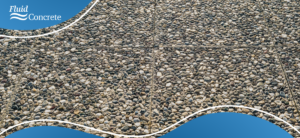Do you need to seal exposed aggregate concrete?

Perfect Surfaces with Peace of Mind
May 7, 2024
The Importance of Protecting and Maintaining Exposed Aggregate Around Pools
August 20, 2024Aggregate concrete is the ideal solution for an area that requires a strong base. It provides a sturdy, streamlined nonslip surface for walkways, pool surrounds, driveways and anywhere you would typically pave or cement while adding character to the area. Does exposed aggregate concrete require sealing? In a nutshell, yes. Sealing your aggregate concrete will keep it in perfect shape by protecting it from damage, stains, and general wear and tear.
The beauty of exposed aggregate concrete
Exposed aggregate concrete is created by applying a layer of stones and gravel to the top layer of plain concrete, resulting in a surface with greater traction and far superior strength compared to a simple concrete slab, with the added benefit of being visually appealing. This makes it suitable for any areas exposed to moisture and slip hazards. It is a durable, low-maintenance solution that will enhance your outdoor aesthetics with multiple colour choices and design options. After the all-important sealant is applied, it will last for many years.
Why you need to seal your aggregate concrete
Does exposed aggregate concrete require sealing is a common question that can only be answered with an emphatic yes. Applying sealant will protect the top surface of the concrete that holds the gravel and stones in place, extending its lifespan while protecting against stains and damage. An added benefit of sealing is the enhanced appearance, with the sealant creating a wet look that highlights the natural colour of the stones you have selected.
Penetrating sealers vs topical sealers
There are two types of sealers available. The first is penetrating which, as the name suggests, penetrates your aggregate concrete creating a strong protection against stains and damage and is very long-lasting. Topical sealers create a protective barrier on the surface of your concrete and are the perfect choice if you want a gloss finish that does not negate the traction of your aggregate concrete. It is generally a cheaper alternative but will require more frequent reapplication, so ultimately the cost differential over time could be negated. Regardless of the type of sealer you select, always ensure the concrete is clean and completely dry before you start the application process. The area will need a minimum of 24 hours to dry properly, so consideration of weather conditions is also important. As with all products, be sure to follow the manufacturer’s instructions to ensure the concrete will be protected for the intended lifespan of the product.
Why not use both?
You may be wondering if exposed aggregate concrete requires sealing with both penetrating and topical sealers. Given these sealers work differently, with penetrating sealer absorbing into your concrete and topical sealer sitting on the surface, it is definitely not recommended to apply both at the same time as they will counteract the properties of each other. If you want to use both, always apply your penetrating sealer first and ensure it is completely dry before applying the topical sealer. Consulting a professional is highly recommended if you are unsure how to change from topical to penetrating sealer or are considering applying topical over a penetrating sealer.
Applying and maintaining your sealer
To make sure your surface is completely clean before application, it is recommended to use a pressure washer to remove any existing stains, mould, or marks. Once this is done, and your surface is completely dried, it is time to start the application process using either a roller or a sprayer. Make sure you check the manufacturer’s recommended method and drying time needed before applying a second coat or using the surface. Once you have completed sealing your aggregate concrete, keep an eye on it for any signs of wear and tear that could indicate it is time to reapply. To get the most out of your sealant, avoid using harsh chemicals or abrasive materials when cleaning the area.
If you want to preserve the durability of your aggregate concrete and maintain the aesthetic, it is highly advisable to apply a sealant. Not only will you be protecting it from stains, but you will also be protecting the anchoring of the gravel, resulting in a harder-wearing surface. Above all, consult a proven professional such as Fluid Concrete if you have any questions or concerns.





